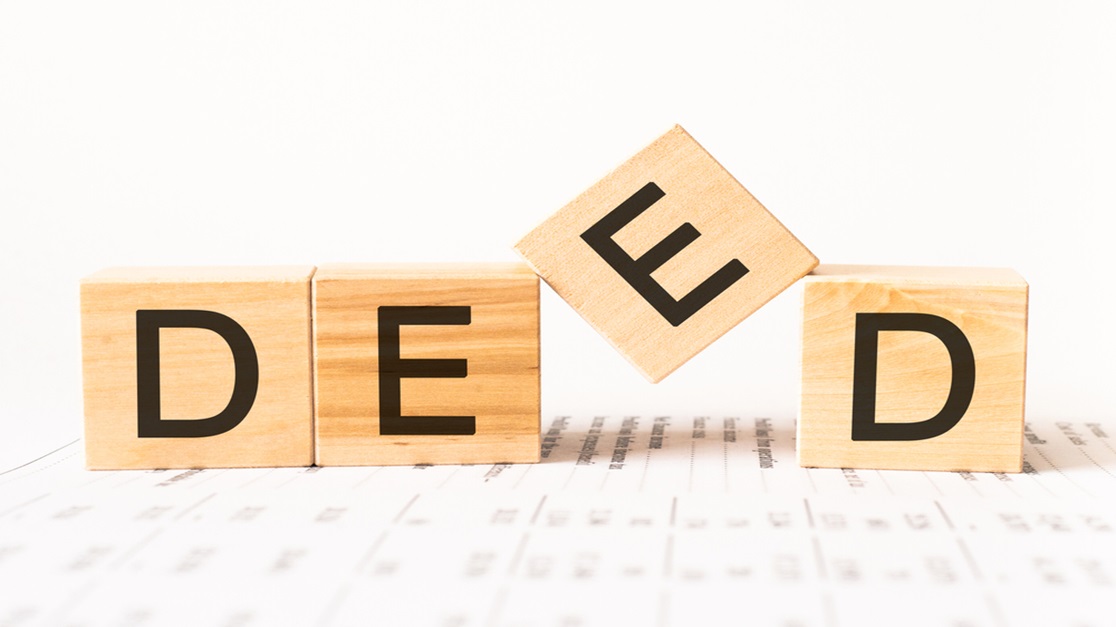Title Deed of Property and Its Importance Explained
April 15, 2025

When it comes to buying or selling a property, one of the most crucial aspects is understanding the role of a title deed. A title deed is a legal document that establishes proof of ownership for a property. In this article, we will explore the significance of a title deed in property sale. We will also provide practical guidance and useful tips for navigating property ownership successfully.
What Exactly is a Title Deed?
A title deed is a legal document that serves as an evidence of ownership of property or land. It includes critical information about the property, including its location, size, ownership history, and any associated rights or obligations. Here's an interesting fact - title deed is also known as 'sale deed' or 'conveyance deed' however there are nuanced differences between them.
Do you know without a title deed, you cannot establish your legal ownership of property? That's how important title deed is, especially when it comes to defining your legal right or ownership over a property.
Why is a Title Deed In Property Important?
A title deed serves as evidence of ownership for a property. It ensures that you have legal rights to use and transfer the property as per your wishes. Without a title deed, there is no concrete proof of ownership, which can lead to various legal complications and disputes. In short, it is among the most important property-related legal documents to have and let us see why.
- A title deed provides security and peace of mind by establishing your ownership rights over the property.
- It helps protect your investment by preventing others from making false claims on your property.
- A title deed is essential when applying for loans or mortgages against your property.
- It simplifies the process of transferring ownership when selling or inheriting a property.
Types of Title Deeds in India
| Types | Features |
| Sale deed | Sale deed is created while selling a property to a buyer as a document to record the transfer of ownership rights from the buyer to seller. |
| Gift Deed | A gift deed is utilised when a property is transferred as a gift from one person to another without any monetary transactions often among family members. |
| Partition Deed | A partition deed is executed when co-owners decide to divide a jointly-owned property among themselves. |
| Relinquishment Deed | This type of deed is used when a co-owner of a property voluntarily relinquishes their rights to a property, allowing the remaining owners to gain full ownership. |
| Mortgage Deed | This document records the terms under which a property is mortgaged, indicating the title is being used as a collateral. |
| Lease Deed | A lease deed grants one party the right to use a property for a specified period. It is common for commercial properties or long-term rentals. |
All of the above mentioned title deeds carries legal weight and must be registered under the Indian Registration Act of 1908 to be enforceable.
How to Get a Title Deed?
The process of obtaining a title deed in property ownership involves several steps to ensure legal transfer of ownership from the seller to the buyer. Here is an overview of the typical process:
- The buyer and seller enter into a legally binding sale agreement.
- The buyer performs due diligence by verifying the property's ownership status, encumbrances, and other legal aspects through an advocate or title search agency.
- The buyer arranges for the necessary finances, such as a home loan, if required.
- The buyer pays the purchase price and other associated costs, such as stamp duty and registration fees.
- Both parties appear before the sub-registrar for property registration. The buyer receives a certified copy of the sale deed, which serves as evidence of ownership.
- The buyer applies for mutation of the property in their name at the relevant municipal authority or panchayat office.
It is important to note that the process may vary depending on the state or location of the property. Consulting with professionals familiar with local laws and regulations is highly recommended to ensure a genuine transaction.
Common Issues Related to Title Deeds in India
Even though Title Deeds are legally binding documents, issues can still arise:
- Disputed Ownership: Sometimes, the chain of ownership is unclear, with multiple parties claiming rights over the property.
- Encumbrances on the Property: A property may have pending dues, loans, or legal claims that aren't revealed until later.
- Forgery and Fraud: Property documents can be falsified, leading to disputes. Always conduct thorough due diligence, including obtaining an Encumbrance Certificate to ensure that there are no liabilities associated with the property.
- Unclear Boundaries: Sometimes, Title Deeds may not properly describe the boundaries of the property, leading to disputes with neighbors or other landowners.
What to Check Before Finalising a Title Deed?
If you're buying a property, it's essential to carefully scrutinize the Title Deed before proceeding. Here’s what you should check:
- Verify Ownership: Ensure that the seller is the rightful owner of the property by checking the Title Deed’s ownership history.
- No Legal Disputes: Check that the property is free from any ongoing legal disputes by getting a legal opinion from a lawyer.
- Encumbrance Certificate: This certificate proves that the property is free from any financial encumbrances like mortgages or unpaid taxes.
- Registration: Ensure that the Title Deed has been duly registered with the Sub-Registrar’s office.
- Original Documents: Always insist on checking the original Title Deed, not just photocopies.
- Success Story: A Smooth Property Transaction
Rahul, a young professional, wanted to purchase his first home in Mumbai. He approached a reputed real estate developer who provided all the necessary legal documentation, including the title deed.
Rahul carefully reviewed the sale agreement and consulted with his lawyer to ensure all terms were fair and legally binding. He also conducted diligence to check verify the property's ownership status and any encumbrances.
The property transaction went smoothly, thanks to Rahul's attention to detail and the developer's transparency. Rahul received his title deed promptly after registration, securing his ownership rights over the property.
Final Thoughts
A title deed in property ownership plays a crucial role in property transactions by establishing proof of ownership. It provides security, protects investments, simplifies ownership transfers, and helps in availing loans against the property. To ensure smooth property transactions, it is essential to have proper legal documentation in place.
Buying a house has never been this easy! Avail Ujjivan SFB’s wide range of affordable home loan products and enjoy a hassle-free loan journey. From house purchase loan to plot loans and home improvement loans, we have it all! Alternatively, you can browse through Ujjivan SFB product suite - our wide range of financial products are designed to make your financial life better.
FAQs
1. What is the difference between a title deed in property ownership and possession documents?
A title deed establishes proof of ownership, whereas possession documents confirm that you are physically occupying the property.
2. Can I sell a property without a title deed?
It is highly suggested to have a title deed when selling a property to avoid legal complications. Buyers will typically require proper legal documents before proceeding with the transaction.
3. How long does it take to obtain a title deed?
The process of obtaining a title deed can vary depending on various factors, such as the location of the property and the efficiency of local authorities.
4. Can I apply for a loan against a property without a valid title deed?
Banks and financial institutions usually require proper legal documentation, including a valid title deed, when approving loans against properties. Without a title deed, it may be challenging to secure financing.
5. What should I do if I lose my title deed?
Losing your title deed can be problematic. It is important to consult with legal experts who can guide you through the process of obtaining a duplicate copy or reissuing the document.
6. Can I transfer a title deed to someone else?
Yes, by following a due legal process. This typically involves executing a sale deed or gift deed, depending on the nature of the transfer.
7. What is the role of a registrar in property transactions?
The registrar plays a crucial role in verifying the authenticity of property documents, ensuring proper stamping and registration, and maintaining official records.
8. What happens if there is an error in the title deed?
If there are errors in the title deed, it is important to rectify them immediately. Consult with legal professionals who can guide you through the process of correcting any inaccuracies or discrepancies.
9. Are title deeds applicable only for residential properties?
Title deep for property ownership deeds are applicable to all types of properties, including commercial, agricultural, and industrial properties.
10. Can I use my property as collateral for a loan without a title deed?
Banks and financial institutions usually require a valid title deed as collateral when approving loans against properties. Without a title deed, it may be challenging to avail loans based on your property.
Latest Blogs

Telangana Housing Board & KPHB Colony: A Guide to Affordable Urban Housing in Hyderabad
March 14, 2025
As Telangana continues its rapid urbanisation journey, two key housing entities—Telangana Housing Board (THB) and Kukatpally Housing Board Colony (KPHB)—have played critical roles in shaping the state's real estate ecosystem.

Does Checking CIBIL Score Frequently Lower Your Credit Points?
April 07, 2025
Imagine you're planning to apply for a home loan, a credit card, or even a car loan. Naturally, you want to ensure your CIBIL score is in good shape before proceeding.

Explained: Can NRIs Buy an Agricultural Land in India?
April 03, 2025
Real estate investment is often a top priority for Non-Resident Indians (NRIs) looking to retain strong financial ties to India.

How to Improve Your CIBIL Score from 600 to 750: A Step-by-Step Guide
April 02, 2025
Your CIBIL score is like your financial reputation—banks check it before approving loans or credit cards. If your score is hovering around 600, you might face difficulties in securing credit or may get loans with higher interest rates.

What Happens When You Leave Your Savings Account Unused?
April 01, 2025
Imagine waking up one day to find that your hard-earned money is locked away and inaccessible. Sounds stressful, right? This is precisely what happens when you leave your Savings Account inactive for too long.



